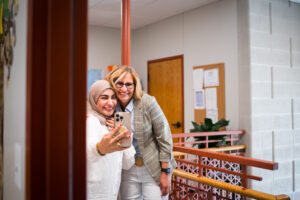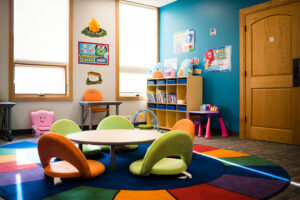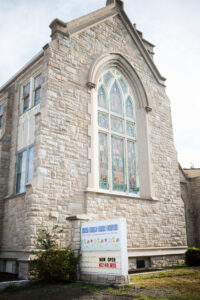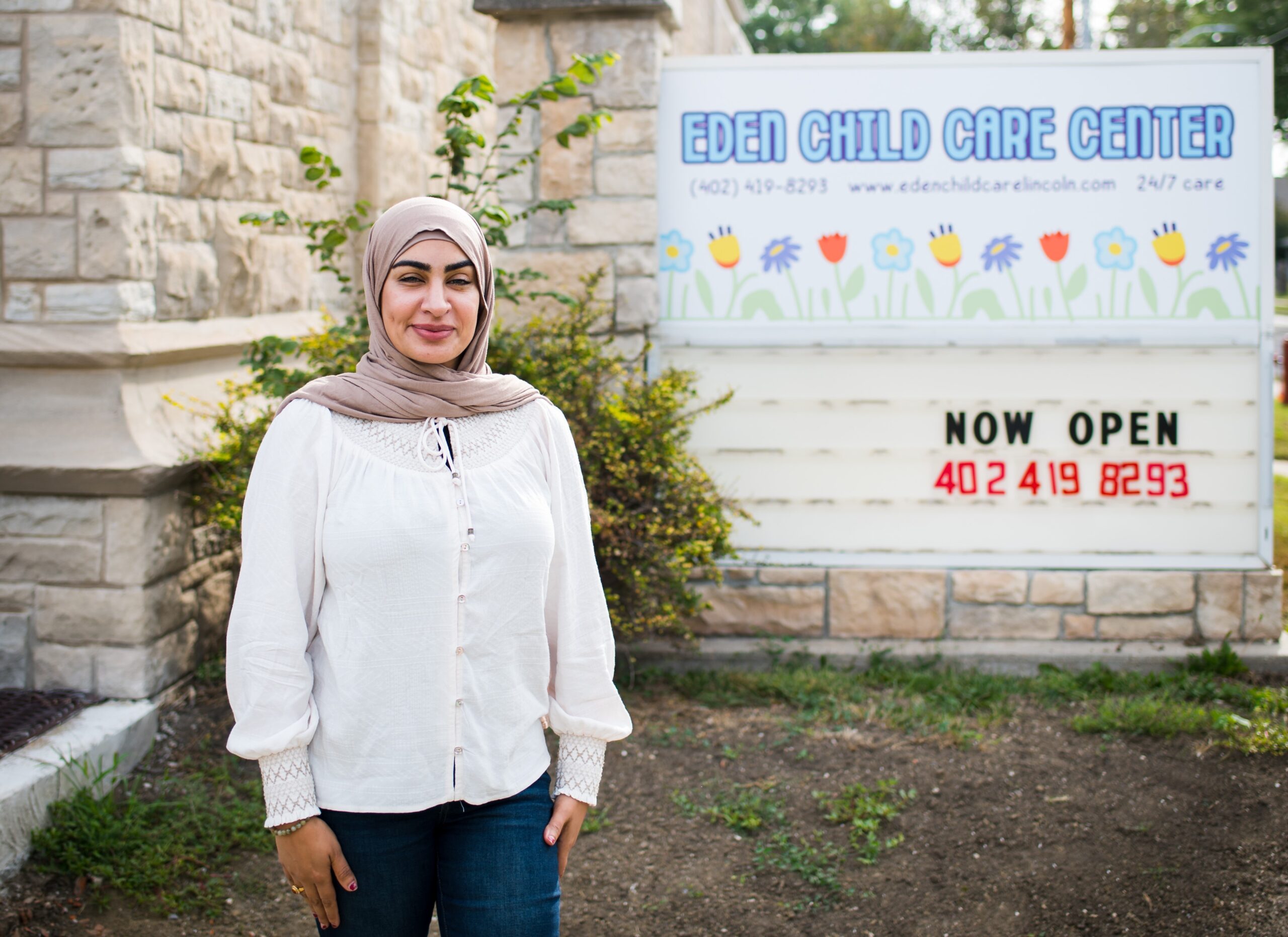By Brittany Wren
Next door to Clinton Elementary, a historic church with a proud bell tower still stands. Inside, a new kind of hope is taking root. On the main floor, you’ll hear the sounds of laughter from a 24/7 childcare center. Upstairs, new affordable housing units are being framed.
This isn’t just a renovation; it’s a revolutionary model for community stability, born because a group of local entrepreneurs, architects and funders looked at the intertwined needs of families and said, “Yes, this is hard. But our community needs this.”
This is the story of what happens when a community dares to solve its own problems – when it decides that every parent deserves to keep their job, every family deserves a place to live and every child deserves a safe place to dream, no matter the time of day.
It’s a story about a building, yes, but it’s really about building a future where everyone belongs.
An architect’s vision
The story begins with a holistic vision. It belonged to Scott Sullivan, a local architect who saw more than an aging United Pentecostal Church with a Late Gothic Revival architectural style. He saw a comprehensive solution to the challenges families face. His idea was to create a mixed-use space that addressed two of Lincoln’s most pressing needs at once: affordable housing units upstairs and high-quality early childhood education downstairs.
Scott purchased the building, recognizing the building’s potential to become an anchor in a diverse, low-income neighborhood. He knew that for a family to be stable, they needed both a safe home and reliable care for their children.
“I just kind of enjoy the envisioning, the solution,” Scott shared, reflecting on his passion for restoration.
And this solution wasn’t simple.
To make the restoration work financially viable and allow for mixed-use development (residential spaces as well as businesses), Scott worked with the City of Lincoln to secure Tax Increment Financing (TIF) and to change its zoning to a landmark overlay. This public-private partnership helped save an older building while simultaneously creating two major community assets: affordable housing and 24/7 childcare.
The church building needed everything – new windows, modern infrastructure, a paved alley, a complete reimagining – but its bones were strong and its potential to serve the community was undeniable.
A provider’s dream
At the same time, Hibah Jabbar, the founder of Eden Child Care Center, was busy planning an expansion. For her, the name is a promise – “Eden” means heaven, a safe, nurturing place for every child. She saw a critical gap in Lincoln’s support system. Her first childcare center was thriving, but she knew families were struggling.
“Many parents who work overnight, they need a safe place for their kids,” Hibah explained.
She dreamed of opening a second center, one that would offer the radical flexibility of 24/7 care, providing a lifeline for parents working in healthcare, manufacturing and other essential, around-the-clock industries. Her center would have the typical childcare amenities like outdoor play areas, napping rooms for overnight care and, she hoped, affordable apartments nearby where employees and parents could live.
They had the vision. They had the passion. What they needed was a connection.

Hibah Jabbar, the founder of Eden Child Care Center, poses with Lincoln Littles Associate Director Suzanne Schneider.
The power of a community that convenes
That connection came from Lincoln Littles. As an integral part of Prosper Lincoln’s Early Childhood initiative, their work is to build bridges. They are the conveners, the matchmakers, the tireless advocates who see the big picture. When they learned of Scott’s building and Hibah’s dream, they knew they had found a perfect match.
The project’s innovative model – combining quality, affordable housing with high-quality early childhood education – was exactly the kind of multi-faceted solution the Lincoln Community Foundation seeks to champion. It directly addresses two of the core pillars of the Prosper Lincoln community agenda. It’s a recognition that a family cannot thrive without a stable home, and a child cannot get a strong start if their parents are struggling to find housing or childcare. This project tackles both.
“Access to 24/7 childcare is a game-changer,” said Lincoln Littles’ Executive Director Anne Brandt. “It’s the missing piece for so many parents working in our city’s most essential industries. This project isn’t just about creating 60 new spots; it’s about giving parents peace of mind and children a wonderful place to grow, at any hour.”
The team at Lincoln Littles, along with partners like Kelly Ross from ECHO Collective, immediately wrapped their support around Hibah. They helped her navigate the labyrinth of state funding and licensing. This included securing a crucial $90,000 startup grant from the Department of Health and Human Services, which allowed Hibah to fill the new space with brand new cribs, toys and furniture, ensuring the children had the best from day one. At the same time, LCF became a crucial partner for Scott.
Half of renting households in Lincoln spend a large portion of their income on housing, according to the 2025 Lincoln Vital Signs report, so helping to bridge the housing gap in a low-income neighborhood was an LCF priority. LCF provided a direct investment in the project and facilitated a loan pool through Community Development Resources (CDR). This collaborative funding was the spark that ignited the entire project, allowing the extensive renovations to begin.
“The combination of housing and childcare was what drew LCF to the project,” said Michelle Paulk, Vice President for Grant Making and Operations. “It hits on two of our Prosper Lincoln pillars.”
This model proves that our community’s greatest challenges can be met when we bring the right people to the table and invest in their shared vision.

A classroom at Eden Child Care Center, a 24/7 center located next door to Clinton Elementary.
A beacon of hope on Holdrege Street
Today, the bell tower at 2980 Holdrege Street stands over a place reborn. Eden Child Care Center opened its doors in the summer of 2025, a stunning, modern facility licensed for 60 children. Sunlight streams through new windows that honor the building’s original design. A once-muddy alley is now a safe, paved entryway for families.
Inside, every detail is filled with purpose. It is a welcoming place for the neighborhood’s diverse families, serving both English- and Arabic-speaking children. There are cozy napping rooms for children staying overnight, a “movement classroom” for yoga and play and bright, welcoming spaces that inspire curiosity and learning. Within a month of opening, Hibah was already serving a growing number of families, a testament to the profound need in the community.
While the Eden Child Care Center is a thriving success, the building’s transformation is not yet complete. The project is now entering its next phase: the conversion of the original church section into 11 or 12 affordable housing units. According to Scott, the architectural drawings are nearly finished, and the goal is to have the entire project completed by the end of 2026.
This project is more than a childcare center with apartments upstairs. It is a vital piece of our city’s infrastructure and a blueprint for the future. It is a haven for children, a stable home for families and a lifeline for working parents.
“The Bell Tower story is a powerful example of community stewardship,” said LCF President Tracy Edgerton. “By creating both stable homes and a nurturing learning environment under one roof, this project provides a powerful foundation for families to thrive. This is how we build a Lincoln where everyone has the chance to prosper.”

Historic stained-glass windows still need restoration at 2980 Holdrege Street

